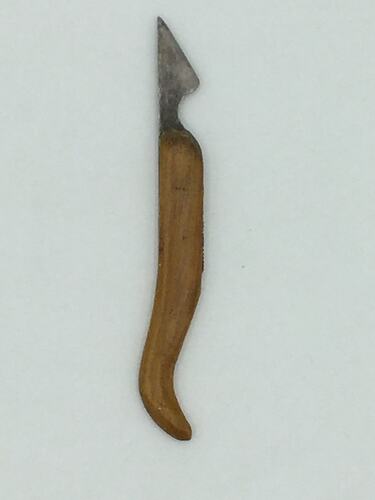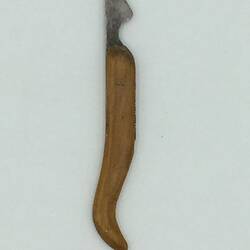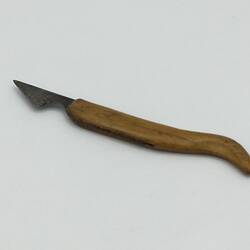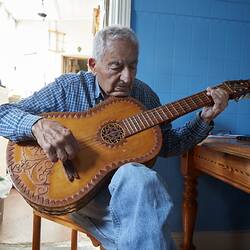Summary
Small knife with hand-carved wooden handle, made and used by Maltese migrant Joseph Scerri in his workshop at home in Brunswick between 1980s and 2010s. This knife was amongst many tools used by Joseph for his woodworking activities, creating guitars, furniture and small furnishings. He made many small knives often having turned the metal blades himself and he made all the wooden handles, often with carving and inlay details.
This item is part of a collection of stringed instruments, tools, components and photographs which demonstrate the creative process of Joseph Scerri. Joseph, his name in Maltese language Guzepp 'Kamussu' Xerri, migrated from Naxxar, Malta in 1964, having grown up without his parents and in poor circumstances. He lived initially in Glenroy and then in various houses in Brunswick and worked for 2 years in a concrete pipe factory in Broadmeadows before a serious industrial accident left him in recovery for 3 years. He later worked in other manual jobs and was able to return home to see family three times. He never married or had children.
Joseph turned to wood carving as a love he had discovered at a young age in Malta but only really applied himself to the creation of guitars, furniture and small domestic items from the mid 1970s. He sourced a variety of timbers, frequently making do with what was at hand, such as re-purposing timber venetian blinds. For him it was a hobby and a creative outlet. It kept him active, occupied, challenged and connected - especially in the context of a difficult and painful working life. For Joseph the guitars, and his other wood carving, became a form of respite and therapy, and the pure joy of making something for no purpose but its intrinsic beauty.
Physical Description
Flattish wooden handle with curved end and metal blade with curve to point.
Significance
This collection provides a significant addition to the Museum's Immigration and Artistic Practice collection which explores how migrants discover, maintain, adapt, reinvent and transform their creative practices in a new environment. The guitars and associated tools and materials demonstrate a high degree of skill for someone self-taught, even if the guitars were not created for professional use. They also demonstrate resourcefulness, with the use of a variety of timbers, frequently making do with what was at hand such as re-purposing discussed timber venetian blinds .
While the pieces are not direct carriers of a particular cultural heritage, or an artistic endeavour transported from another country, they do represent the significance of creativity in keeping people active, occupied, challenged and connected - especially when without a circle of family and in the context of a difficult and painful working life. For this maker the guitars, and his other wood carving, became a form of respite and therapy, and the pure joy of making something for no purpose but its intrinsic beauty and an expression of the maker's skill.
This collection enhances other musical instruments relating to the migration experience, such as the Italian Cera mandolin and Ceresoli accordion, the Trinidadian steel pan, the Nepalese ukelele and Lithuanian lagerphone.
More Information
-
Collecting Areas
-
Maker
-
Classification
-
Category
-
Discipline
-
Type of item
-
Overall Dimensions
115 mm (Length), 11 mm (Width), 5 mm (Depth)
-
Keywords
Maltese Immigration, Musical Instruments, Woodworking, Woodworking Tools, Hobbies, Workshops



